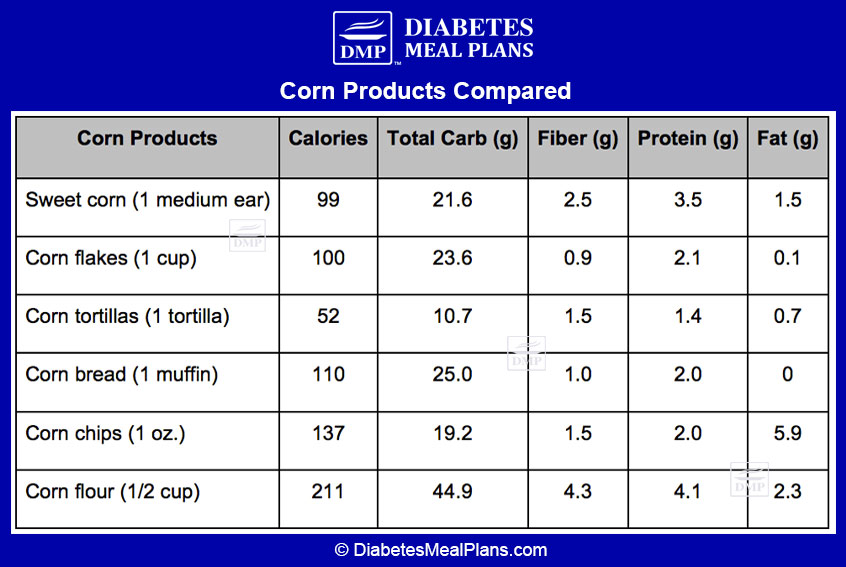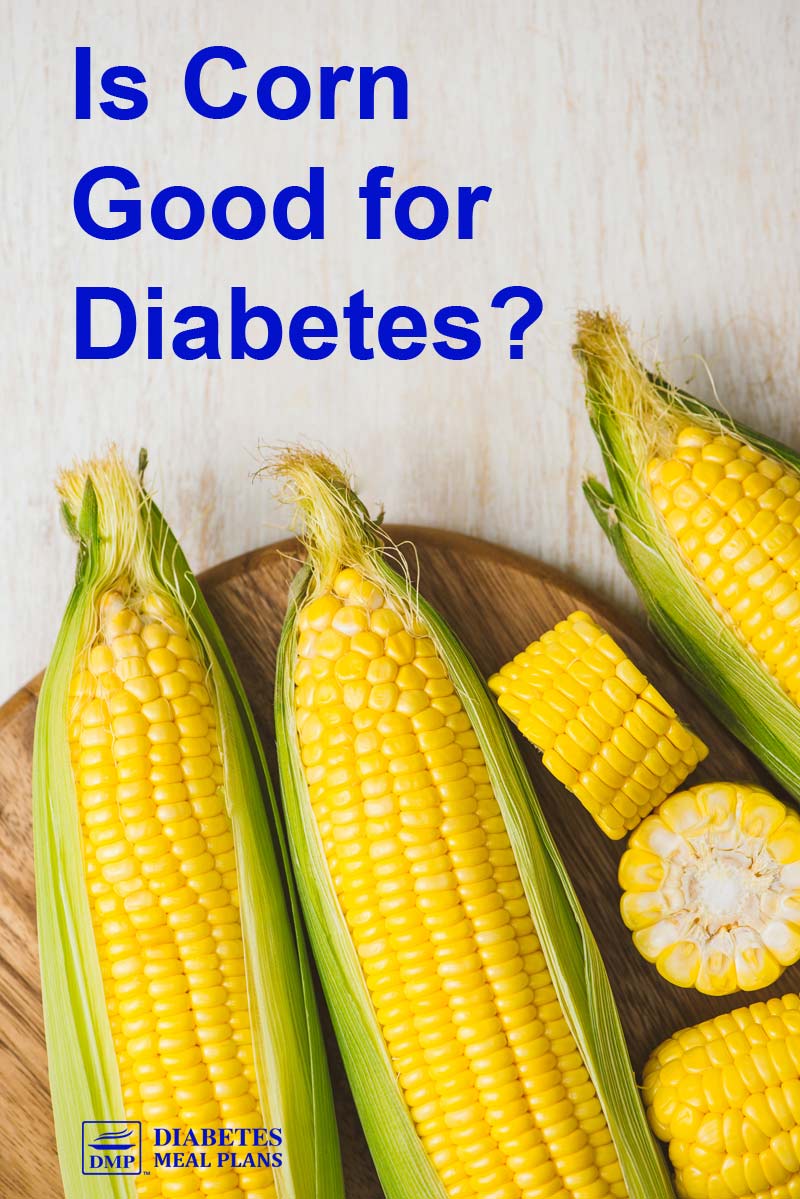Table of Contents[Hide][Show]
Corn is a sweet vegetable that many of us enjoy – buttering up an ear and biting down on the juicy sweetness is certainly a treat. But is corn good for diabetes?
It’s a question that comes up frequently.
So let’s explore corns’ nutrition facts, compare some corn products, look at research on corn and diabetes, and answer the question: is corn good for diabetes?

What is Corn?
Corn is a popular starchy vegetable that grows in a tall stalk.
Almost half of the world’s corn is produced in the U.S. Midwest with the rest coming from South America, China, and Eastern Europe.
From basic corn-on-the-cob to the high fructose corn syrup in your soda, corn products are everywhere.
Because corn is a staple food in many countries and it is grown so widely, it is usually inexpensive.
But while it is a staple, for people with diabetes, it doesn’t make a good companion.
Corn Nutrition Facts
For one medium ear of cooked yellow sweet corn (103 g):
- Calories: 99
- Carbohydrates: 21.6 g
- Fiber: 2.5 g
- Protein: 3.5 g
- Fat: 1.5 g
Corn is a starch and most starches are the high carb foods you want to avoid.
Yes, corn does contain some protein, fat, and fiber, but the 2.9 g of fiber pales in comparison to the 21.6 g of carbs!
Compare that to one medium carrot with 5.8 g carbs and 1.7 g fiber. Or medium head of cooked broccoli at 12.9 g carbs and 5.9 g fiber – these lower carb veggies are going to be much better for blood sugar and A1c control!
On the other hand, the carbohydrates in corn will be broken down into sugar and absorbed much quicker into your bloodstream. And it’s those blood sugar highs that you want to avoid to reduce your risk of diabetic complications.
Corn Products Compared
Unfortunately, most of the products made from corn are also pretty high in carbohydrates.
Take a look at the variety of corn products on the market:

While the numbers do vary, all of these products fall into the “high carb” category. The exception may be the occasional corn tortilla, but even then you’d want to keep it to one tortilla only and pair it with proteins and fat.
When it comes to higher carb foods, they are best avoided. But if you are going to indulge, you must think about the serving sizes if you don’t want to see your numbers skyrocket.
For instance, the corn tortilla contains 10.7 g of carbs (9.2 g net carbs). But that’s for just one small tortilla. How often do you go to a taco bar and only make one little taco?
That one little taco easily becomes three tacos and then you’re looking at over 30 g of carbs from the tortillas alone, without factoring in any additional toppings.
This is also true for snacks like corn chips or corn bread muffins. Most folks don’t stick to just one muffin or just one ounce of chips (around 10 chips) – a plate of nachos is often stacking up with several ounces of chips and all those carbs can add up fast, 20 grams of carbs turns to 40, 40 turns to 60, and 60 turns to 80 grams of carbs – it can happen easily with these high carb foods!
Corn flour and corn meal are often used in baking, but they are also very high in carbs. When you compare the 44.9 g of carbs in a half cup of corn flour to the 12 g of carbs in a half cup of low carb almond flour, there is just no competition.
One corn product not shown on the comparison chart is the infamous high fructose corn syrup.
Many soft drinks have 60-100 percent of their sugar content coming from high fructose corn syrup, which is incredibly high in carbs.
Twenty five grams of high fructose corn syrup contains 19 g of carbohydrates in the form of straight sugar, so you can see how sodas and sweet drinks can easily carry up to 50 g of carbs in a single serving.
Please pin, tweet or share; then keep on reading.

Research on Corn and Diabetes
In countries where high fructose corn syrup is available, or included in products, the prevalence of diabetes is 20% higher than countries that don’t have access to it.
Most other research on corn is also based on it’s byproduct, high fructose corn syrup, none of which is good. Suffice to say, there is no evidence showing the consumption of corn helps with type 2 diabetes or prediabetes treatment. That’s not surprising since corn is a high carb food and high carb foods raise glucose, not lower it, which is your ultimate goal.
On the opposite spectrum, research shows a low carb diet is a great strategy for managing blood sugar, A1c, cholesterol, and body weight.
One study compared the effects of a low carb, high fat diet (14% of energy, less than 50 g of carbs per day) versus a high carb, low fat diet (53% of energy) for patients with type 2 diabetes.
The results showed that both diets did help improve A1c, weight and fasting glucose. But the low carb diet performed much better for overall glucose control, the participants also had lower cholesterol levels, and a greater reduction in medications required.
Another study examined how a low carb Mediterranean diet versus a low fat diet would affect the health of type 2 diabetics over several years.
The researchers found that the people adhering to the low carb Mediterranean diet (~43 g carbs per day) had lower A1C levels, a higher rate of diabetes remission, and a delayed need for diabetes medication when compared to the group on the low fat, high carb diet.
These studies really show the power of a low carb diet (and there are many more of them)! That’s exactly why we base our dietary philosophy on a lower carb diet. And our weekly meal plans are helping people lower blood sugar and A1c!
“I just wanted to share my great results having been on this plan for only one month. 3 months ago my A1C was 8.7 and my recent blood work showed it at 7.4. My endocrinologist was very impressed and thinks I will be at the target level by my next testing in 3 months. I am excited to continue on this plan and maybe I can stop one of my injections. Thank you for your dedication to diabetes research and food plans.” ~Gloria G (VIP Member)
Conclusion
It is safe to say that corn doesn’t really fit well into a low carb, diabetes friendly diet plan.
Fats, proteins, and high fiber foods will stabilize your blood sugar and help you reach your goals. So, ditch the corn and spare yourself the extra carbs.
And overall you shouldn’t miss corn at all. There are plenty of other delicious vegetables to be enjoyed. And with the blood sugar friendly vegetables available to you, there are literally hundreds (if not thousands) of low carb meals to be enjoyed – meals that won’t send your blood sugar soaring!
Please pin, tweet or share this info to help others – thanks!

Arleta Hobbs
I found out to cut out ALL whites and yellow foods. What’s are just as bad as corn. No breads, cereals, ice cream, no gravy, mashed potatoes, no cream of wheat or grits. If you want to eat any you have to eat very small servings. A sliver of cake if at all, half cup of ice cream maybe. If I can just get a yearn for the taste out of my system I’m OK. But 1 teaspoon of corn satisfies my yearn for it. But I chew it as long as I can. Lol
I hope this helps. I’m a corn lover too. But I learned how to control most of this diabetes thing. I think!
Sam
Before eating corn my blood sugar is 5.5 after eating goes to 11.9 after 3hours drops to 6.5 so what can i do?
Malorie: Dietitian (MS, RD, CLT)
Hi Sam, If your blood sugars are impacted that much from eating corn I would suggest removing it from your diet. As mentioned in the article, corn is a high carbohydrate starchy vegetable and may not be the best option for individuals with diabetes. There are plenty of other delicious non starchy vegetables to incorporate into your diet!
iris
Interesting .
Bob trendel
Yep. Have been on insulin for over 50 years. 4x per day. I love corn on the cob and every year at corn time I have it about 4 or 5 times, each time 2 medium size ears. Very good and always fresh. Cut down on desert or your mashed potatoes and enjoy fresh corn on the cob.
Bob
Emily - Dietitian (MS, RD)
How is your blood sugar control, Bob? It sounds like corn is something you really look forward to! If you’re looking to improve your control without having to give up corn maybe you could try just one ear at a time instead of two. This would significantly reduce the amount of carbs you’re taking in at a single meal.
Doug Rudder
That’s easy for you to say that l won’t miss corn.l miss it like l miss my potatoes. Blessing
Qasim Gardezi
It’s good to read this. It will help me a lot to control my diabetes. Currently my I using 25 units of insulin twice a day with Sitamet 5 / 50 twice a day. But still my blood sugar varies.
Emily - Dietitian (MS, RD)
Diet plays a huge role in your sugar levels and people sometimes underestimate that fact. Keep exploring the blog for more helpful information. Check out this article for a comprehensive list of the best foods for diabetes.
Maajid
Hi Jedha
The recent test level was fasting 126 and after 1hour meals 157.
During RAMZAN the fasting month it was 96.
I am taking one tab of Metadose 850.
Lover of corns
Season now a days in my native place kashmir
Can I have one corn a day please suggest
Emily - Dietitian (MS, RD)
Unfortunately as you read in this article, corn is very high in carbs and consuming daily would likely make your sugar much harder to control. For that reason, I would not advise you eat corn daily. If you choose to indulge occasionally make sure to monitor your sugar levels after. Your best bet as far as vegetables is to pick non starchy veggies such as the ones on this list.